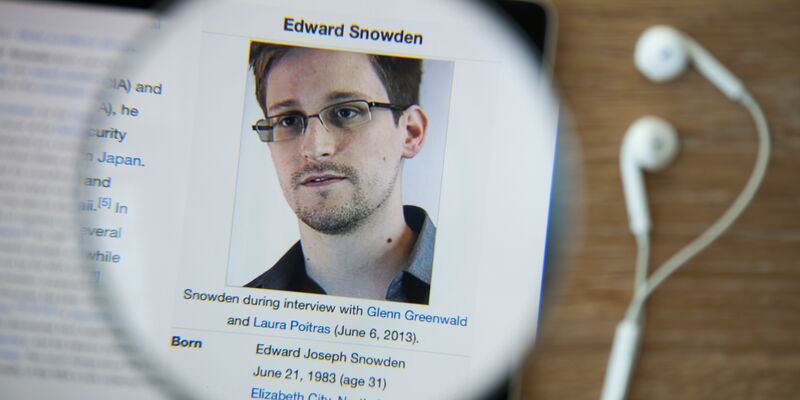
- The University
- 28/06/2019
Edward Snowden gives video lecture on privacy
Edward Snowden was the main man during a symposium on Security in Times of Surveillance. The controversial American gave a lecture on creating a more private world, via a direct video connection in the Blauwe Zaal on Friday. As a whistleblower, he is ‘America's most wanted’ after revealing the NSA program that secretly tracked millions of people.
His talk Combating online surveillance caused a full house. The technical, political and legal aspects of security and surveillance are discussed. “You are here now. Probably with your phone in your pocket, which is on. It is now possible to trace where you are. You have a SIM card with a unique number which enables you to be reached (almost) anywhere in the world. Every telephone continuously transmits a signal: "Here I am.” And the transmission tower says: "Yes, I hear you." You are always connected to the nearest tower and it reveals your (approximate) location," Snowden explains.
That kind of metadata can also be dangerous. Not only messages that leak can entail risks, but data about the location of your communication can also help authorities to discover patterns.
Technology as a weapon
Snowden indicates that technology can become a terrible weapon. When the government says it has to tap someone’s telephone for national security, it provides a focus on devices rather than people. If it then believes to have located the suspect, but in the meantime that person has already sold his phone to an innocent person, a very painful situation can arise in which an innocent citizen calls using that second-hand phone and gets shot.
This has happened before, Snowden says. The internet was once created to be used with a cooperative mindset. For people who want to do and share things together. But then, according to him, it was taken over with a different interest ...
When you ask what the most dangerous company is in terms of data, many people say Facebook or Google. Snowden thinks it's Amazon. “The most traffic is expected there and it has a close relationship with the US Intelligence Community. No doubt in my mind," Snowden says.
Global mass surveillance
“The world is changing, faster than ever. Everything is connected: phones, workplaces, friends, countries and ultimately the world," Snowden explains. He emphasizes how much data has already been stored and how much will still be stored in the future by companies and the government.
The tendency is: if we can have mass surveillance, why only tap individual devices? We can tap transatlantic via the shared structures all communication passes by. Then we end up in a kind of ‘global mass surveillance’.
Mass surveillance starts with the passive collection of information. And this does not just concern the United States as Big Brother. Other countries, such as China and Russia, have also tried but were less successful. And it's not just about governmental interest: companies like Google and Facebook are also more than happy with your data. “We use Google Hangouts here to give this talk. Google now also has a copy of this conversation and can, in theory, pass this on to the FBI."
PRISM
PRISM, the secret program of the NSA, is also briefly discussed in Snowden's talk. He shows a timeline with dates from when certain providers started sharing data with the NSA. Microsoft already started in 2007. Google and Facebook followed in 2009 and after a few more providers, Apple was the last, in 2012.
This can concern search behavior and account details, but also e-mails, like Yahoo used. That company scanned the emails from users for the benefit of the US government. All data is collected regardless of privacy or the law. Snowden: “America is not worried about anything. Not about the law in Germany or in the Netherlands, no because we are America, we don't care.”
Whistleblower
The question is: how do we create a more private world? The whistleblower who has found asylum in Russia does not immediately have a ready made answer for the audience. He does emphasize that encryption is important. “A lot of data was sent without encryption for a long time. That's actually incredible when you think about it. Take for example search behavior on search engines. There is a history available of everything ever searched for. Also webcam images used to be sent without encryption and the intelligent services have collected them. Encryption does provide some meaningful protection against mass surveillance. But even the best encryption can't save us if we get hacked. And if the key itself is lost or stolen, we also have a problem.” But the communication must be properly encrypted, that’s for sure.
Discussion